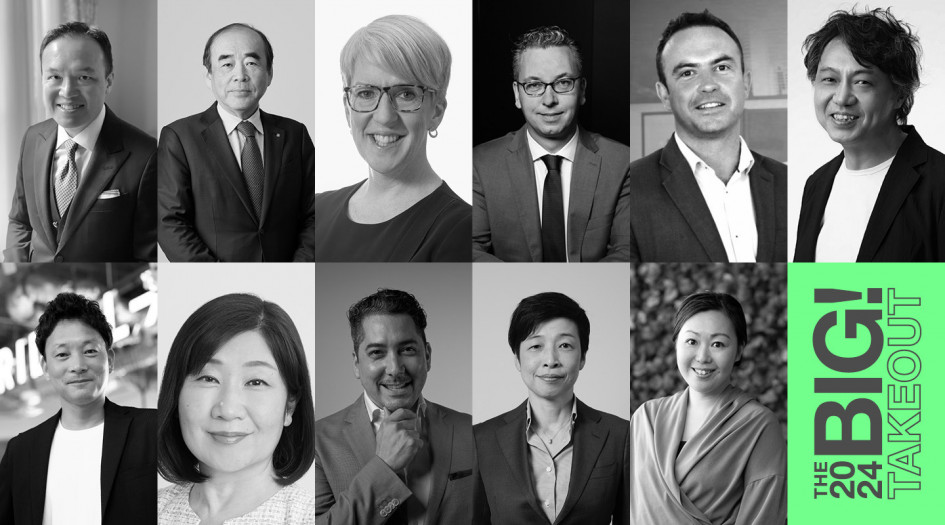The Big Takeout 2024
It’s been a busy year for our Eat Takeaway series and as the end of 2024 draws near, we take stock and digest all the incredible insights and learnings we have gained from brand, marketing and business leaders across the industry landscape—from iconic Japanese beverage brands including Asahi and Suntory that are at the forefront of diversity and human-centric marketing to organisations like cosmetics brand Jurlique in Australia and Hong Kong public transportation brand MTR that place sustainability and ESG frameworks at the heart of their business.

Read on for our take on the biggest challenges and opportunities brand and marketing leaders have been embracing this year and what this could mean for brands tomorrow.

Partnerships at the heart of innovation and growth
As competition in every sector and industry has intensified, partnerships and collaborations have become a powerful way to accelerate the development of new products, tap into new audiences and piggyback on operational and marketing platforms. Many brands today are going to greater and greater lengths to find unique partnerships that can be hugely beneficial in the short term, be it a one-off collection or product collaboration, and in the longer term with strategic partnerships and joint ventures, even between competitors.
Iconic home accessories brand Lladró, known for its precious porcelain figurines, has seen big success through partnerships in recent years. For the brand’s 70th anniversary they launched a partnership with the Star Wars film franchise, which included a limited-edition gold Darth Vader figurine. Not only was the collection a financial success, selling out immediately, but it also introduced the Lladró brand to younger audiences. President and Representative Director for Llardó in Japan, Colin Chow, sees these bold partnerships as a critical tool to rejuvenate their clientele beyond their usual older customer base.
"We see ourselves not just as architects and engineers, but also mediators and facilitators who bring people together through our work" Yoshihiko Sano, President, Yasui Architects & Engineers
And there is a tremendous diversity of partnerships to explore that can bring all kinds of benefits – from helping a brand double down on its purpose, to taking a leadership position in a whole category. Yoshihiko Sano, President of Yasui Architects & Engineers, known for designing some of the most iconic spaces in Japan including the Suntory Hall in Tokyo and Kyoto Racecourse, told us that the emerging generation of architects place a much greater emphasis on citizen engagement than their predecessors. From workshops to social media engagement, architects are tapping into the wider public for ideas and to build societal support for their projects. This is fundamentally changing mindsets in the industry – where architects are not only expected to be creators, but to also be skilled mediators and communicators.

Accelerating evolution for Japanese brands
Japan has been a big global focus in 2024. The country’s reopening since Covid as well as a cheap yen unleashed a flood of tourism into the country. The currency was also a boon for Japanese exporters, reflected in a big uptick in share prices on Japan’s stock indices. Continued challenges in the Chinese economy means investors have been turning their attention to Japan as an alternative home for their capital. The sentiment has been quietly positive on the potential for Japan to make a return to the economic heights of the mid-late 20th century, ending over 30 years of stagnation.
Alongside these big macro-economic evolutions, our year of Eat Takeway interviews gave us an exceptional insight into the evolution happening within Japanese firms as they aim to remain competitive, win top talent and build roadways for long-term success.
This evolution can be strongly seen at Asahi Group Holdings, one of the world’s largest beverage firms which owns iconic beer brands including Asahi Super Dry, Peroni and Fuller’s London Pride. Diversity, Equity and Inclusion (DEI) Advisor for the group company, Hiromi Yamagishi, has been championing DEI as a driver of business performance across the firm. In a country where women only account for 11% of management roles today, Asahi has committed to having at least 40% of leadership positions held by women by 2030. This is much closer to where things stand in the US at 42% and far above the global average of nearly 30%.
This push is being built on the tactical impact that DEI has on business. Hiromi highlights that groups with high levels of homogeneity lack diverse ideas and miss new opportunities. They also lack perspectives on unexpected risks. Based on this principle, Asahi has been diversifying its product portfolio, creating its own ‘smart category’ of drinks that contain less than 3.5% alcohol. The expansion is really about accommodating a more diverse range of consumers, including those who only want to drink a little alcohol or none at all.
“You can’t create a unique emotional experience without thinking about and exploring the employee experience” Katsuaki Nagumo, Chief Marketing Officer, TORIDOLL
Similarly TORIDOLL, one of Japan’s largest restaurant owners and operators with brands in its portfolio including Marugame Udon and Franco Manca, has been bringing a greater employee focus in its corporate and brand strategy. TORIDOLL Chief Marketing Officer, Katsuaki Nagumo, says “You can’t create a unique emotional experience without thinking about and exploring the employee experience”. By integrating TORIDOLL’s HR and marketing divisions, Katsuaki wants to see an increase in workplace satisfaction and employee happiness that will bring down turnover and build a desire amongst employees to create more remarkable experiences inside and outside the business.
The evolution has been even more prominent as a result of global upheavals such as the Covid-19 pandemic. Japanese food service brand Hoshizaki, a stalwart of kitchen hardware, was hugely affected as restaurants shut down around the world and orders slowed. This ultimately pushed the firm to look for new opportunities. Naoko Jihira is Head of Communications at Hoshizaki Corporation. She told our Eat Takeaway Live audience that a diversification push during the Covid years, into areas including agriculture, fishery and welfare services, means today 60% of Hoshizaki’s domestic product sales come from areas outside the restaurant space. Alongside this, continued labour shortages in the food service industry means Hoshizaki has stepped into that gap with new technologies including robotics. For Naoko, imagination and a need to uncover never before anticipated needs from consumers are absolute imperatives.

Bravery in the face of change
Like the newfound willingness to explore new partnerships or make substantial changes to the product mix and brand proposition, our interview series has shown really what we can only call bravery – bravery to take risks, to tell more impactful stories, and to go against the status quo and do things in new ways. This bravery is very much a reflection of the increasing competitiveness we have discussed – a need to push boundaries and find unconventional solutions that will deliver true competitive advantage.
John Ralph, Founder and CEO of beverage business Intrepid Spirits has built a portfolio of what he calls “fearless brands” in Japan, China and the USA. When introducing their Cocalero brand, now the number one selling liquor brand in Japan, they didn’t go immediately for the big distributors. They went into small bars in Kyoto, Osaka and Kobe, built relationships with DJs and music producers, and really tapped into a counterculture essence in Japan. By the time they launched in Tokyo, pent up demand was high and sales took off. A willingness to take risks and running at niche opportunities has stood the business in good shape and sits at the heart of Intrepid’s growth strategy.
"We didn’t go near Tokyo at all in the first year – we went to the smaller but prominent cities like Kyoto, Osaka and Kobe – taking the Cocalero brand into small bars and doing a lot of bar training" John Ralph, CEO, Intrepid Spirits
Bravery has many faces. For some this may be about taking risks and going with your gut, while for others, it’s about championing the unique stories from your brand that aren’t being told. For Loic Rethore, CEO of Australia-based cosmetics brand Jurlique, there are stories across the brand and its operations that need to be told in a more impactful way. This is critical to connecting with consumers more authentically and ultimately being more relevant to them. The core philosophy of Jurlique is being “a pioneer of holistic and conscious beauty”, built on natural product development based at their biodynamic farm which provides all the active ingredients and botanicals for their cosmetics. In partnership with indigenous communities, Jurlique is cultivating local botanicals, supporting healthy local ecosystems and adapting practices to grow botanicals successfully in the climate found in the Adelaide Hills of South Australia. With so many rich stories to tell, Jurlique must take the initiative, particularly as the natural beauty segment expands, bringing in new competitors that may bring a similar offer to market.

Purpose as the North Star for decision-making
This year, brand and organisational purpose has been revealed as a critical guide for decision-making across the industry landscape. Purpose sits at the center of three core facets every business and brand leader needs to establish – 1. What do we do better than anyone else? 2. What does the world need that we can provide? 3. What change do we want to make in the world? By revealing and understanding your company’s position on these questions, leaders can build new competitive advantage and bring beneficial impact across the stakeholder spectrum – from shareholders, to employees, to partners, customers and communities.
MTR Corporation is Hong Kong’s flagship public transport firm, designing, building and operating the city’s metro system. Gill Meller, MTR’s Legal and Governance Director, points to the firm’s core purpose – Keeping Cities Moving – as the filter for decision making on where they focus their efforts and invest their capital: “What is our role? Why do we exist? Focus on that and we think about how we can support our staff and continue delivering the railways and services to the people that need it”.
The purpose that sits at the heart of MTR, has been tightly integrated into the new ESG (Environmental, Social, Governance) framework Gill helped develop for the firm. Annual KPIs are set across ESG areas, with strategic clarity on what MTR does in these areas and just as importantly what it doesn’t do. “Someone may approach us and talk about cleaning Hong Kong harbour. It’s important, but it’s not really relevant or material to us as a business”. Instead MTR are focusing on reduce the carbon emissions from the metro network, deploying cutting edge technologies such as kinetic braking to increase energy generation and efficiency.
“What is our role? Why do we exist? Focus on that and we think about how we can support our staff and continue delivering the railways and services to the people that need it.” Gill Meller, Legal and Governance Director, MTR
For Suntory, global owner of beverage brands including Hibiki whiskey, Jim Beam bourbon and BOSS coffee, a foundational brand purpose, or principle, has guided the firm since it’s founding in the late 19th century. Yoji Minakuchi, Chief Design Officer for Suntory Holdings, speaks about the “people-centricity” of the Suntory brand. The brand has always strived for emotional resonance of its products with customers. Grounded in the principle of “cherishing humanity”, Suntory and all its communications strive to uplift people in life.
These are storied, established brands that have never wavered from that foundational brand purpose whilst still realising new ways to innovate and bring game-changing models and products to market. As Yoji has said “this may seem like a contradiction, but as long as we are Suntory, we must achieve both goals – a commitment to nature and to being human – simultaneously”.
Thanks again to all those who have participated in our Eat Takeaway interviews this year, and we look forward to the new perspectives and unique learnings we will hear from our community in 2025!
You can check out all the interviews and discussion held with brand, marketing and business leaders this year at our insights page. Be sure to check out the three takeaways at the end of each piece for guidance on actions you can take in your own brand development efforts.
If you enjoyed this piece, subscribe here to The Eat Digest - our monthly newsletter covering our latest insights, Japan brand and marketing news, and much more!